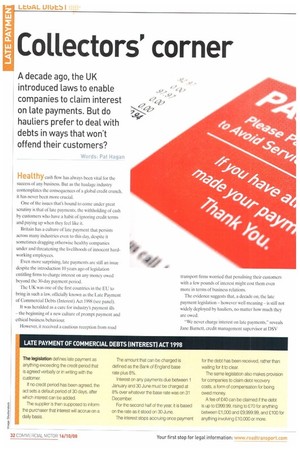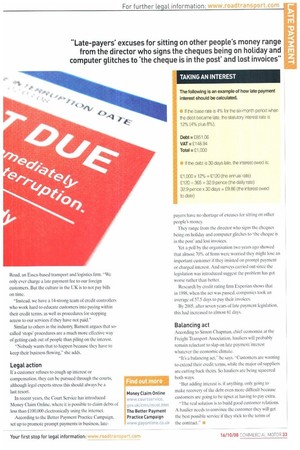Collectors' corner
Page 32

Page 33

If you've noticed an error in this article please click here to report it so we can fix it.
A decade ago, the UK introduced laws to enable companies to claim interest on late payments. But do hauliers prefer to deal with debts in ways that won't offend their customers?
Woras; Fat Hagan
H ea lt hy cash flow has always been vital for the success of any business. But as the haulage industry contemplates the consequences of a global credit crunch. it has never been more crucial.
One of the issues that's bound to come under great scrutiny is that of late payments, the withholding of cash by customers who have a habit of ignoring credit terms and paying up when they feel like it.
Britain has a culture of late payment that persists across many industries even to this day, despite it sometimes dragging otherwise healthy companies under and threatening the livelihoods of innocent hardworking employees.
Even more surprising, late payments are still an issue despite the introduction 10 years ago of legislation entitling firms to charge interest on any money owed beyond the 30-day payment period.
The UK was one of the first countries in the EU to bring in such a law. officially known as the Late Payment of Commercial Debts (Interest) Act 1998 (see panel).
It was heralded as a cure for industry's payment ills — the beginning of a new culture of prompt payment and ethical business behaviour.
However, it received a cautious reception from road transport firms worried that penalising their customers with a few pounds of interest might cost them even more in terms of business relations.
The evidence suggests that, a decade on, the late payment legislation — however well meaning — is still not widely deployed by hauliers, no matter how much they are owed.
"We never charge interest on late payments," reveals Jane Barnett, credit management supervisor at DSV Road, an Essex-based transport and logistics firm. "We only ever charge a late payment fee to our foreign customers. But the culture in the UK is to not pay bills on time.
"Instead, we have a 14-strong team of credit controllers who work hard to educate customers into paying within their credit terms, as well as procedures for stopping access to our services if they have not paid."
Similar to others in the industry. Barnett argues that socalled 'stops' procedures are a much more effective way of getting cash out of people than piling on the interest.
"Nobody wants that to happen because they have to keep their business flowing," she adds.
Legal action
If a customer refuses to cough up interest or compensation, they can be pursued through the courts, although legal experts stress this should always be a last resort.
In recent years, the Court Service has introduced Money Claim Online, where it is possible to claim debts of less than £100,000 electronically using the intemet.
According to the Better Payment Practice Campaign, set up to promote prompt payments in business, late payers have no shortage of excuses for sitting on other people's money.
They range from the director who signs the cheques being on holiday and computer glitches to 'the cheque is in the post' and lost invoices.
Yet a poll by the organisation two years ago showed that almost 70% of firms were worried they might lose an important customer if they insisted on prompt payment or charged interest. And surveys carried out since the legislation was introduced suggest the problem has got worse rather than better.
Research by credit rating firm Experian shows that in 1998, when the act was passed, companies took an average of 57.5 days to pay their invoices.
By 2005, after seven years of late payment legislation, this had increased to almost 61 days.
Balancing act
According to Simon Chapman, chief economist at the Freight Transport Association, hauliers will probably remain reluctant to slap on late payment interest whatever the economic climate.
"It's a balancing act," he says. "Customers are wanting to extend their credit terms, while the major oil suppliers are cutting back theirs. So hauliers arc being squeezed both ways.
"But adding interest is, if anything. only going to make recovery of the debt even more difficult because customers are going to be upset at having to pay extra.
"The real solution is to build good customer relations. A haulier needs to convince the customer they will get the best possible service if they stick to the terms of the contract." •
















































































































































































